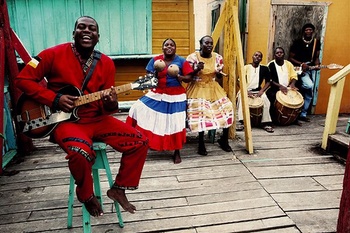(© Peter Rakossy)
The news, on 19 January 2008, of Andy Palacio’s death came as a terrible shock. Palacio, the singer whose album Wátina had put Garifuna culture on the map, died suddenly of a heart attack. His band the Garifuna Collective is now back with a new album, Ayó, a tribute to their late frontman.
"We were devastated by the news, but Andy’s death also spurred us to carry on his work with even greater passion,” says Joshua Arana, percussionist of the Garifuna Collective. The 47-year-old singer and guitarist Andy Palacio had become a national hero by bringing the marginalised culture and music of the Garifuna, descendants of slaves in Belize, Guatemala, Honduras, and Nicaragua, to the world in 2007 his album Wátina.
Six years on, you’re back with Ayó, which means “farewell”.
Joshua Arana: We are bidding Andy farewell, but we will never say farewell to his soul or to his idea of presenting our culture to the world. We don’t believe in borders between cultures: for us, all cultures are equal. People try to turn communities against each other on the basis of race and culture. To turn the tide, we have to get to know each other’s cultures better, so that we will have more respect for each other.
The Garifuna Collective: I for you and you for me

Is the Garifuna culture still threatened?
Arana: In Belize and other parts of the Caribbean, the traditional cultures are under threat. That’s why Andy [who was already a star of punta rock – BT] made it his mission to promote our culture. Music transcends borders, cultures, and races. There is no better way to ensure our culture survives than through music. And it works: before Wátina, lots of young people were only interested in American pop; they wore FUBU and Nike. Now they’re getting interested again in our tradition, because they see that our culture is appreciated in other parts of the world.
Are you more of a cooperative than a group?
Arana: That’s true: we are a loose cooperative of musicians that varies according to everyone’s availability. Everyone who supports the struggle of the Garifuna – even if only by buying a CD or coming to our concert – is part of the cooperative. Together, we ensure the continued existence of our culture.
“Galuma” is a song about catching fish. How important is that for the Garifuna?
Arana: Our ancestors were fishermen who lived on the coast. Fish was our most important source of food. Since then, many Garifuna have moved inland to look for work and better living conditions for their families.
Garifuna culture is based on the principle of “Au bun, amürü nu”: I for you and you for me. What exactly does that mean?
Arana: If I have something, then you have it too. And the other way round. Everything is common property in the community. All the adults in a village are responsible for the children. When we have fishermen and farmers, then everyone has something to eat, as everything is shared. These days, that can no longer be taken for granted. Poverty in Belize is rampant, while the government is spending money on pointless things. They are buying weapons, while there are children dying of hunger.
THE GARIFUNA COLLECTIVE • 3/10, 20.00, €9/13/15, Muziekpublique, Théâtre Molière, Naamsepoortgalerij/galerie de la Porte de Namur, Bolwerksquare 3 square du Bastion, Elsene/Ixelles, 02-217.26.00, www.muziekpublique.be
Read more about: Muziek
Fijn dat je wil reageren. Wie reageert, gaat akkoord met onze huisregels. Hoe reageren via Disqus? Een woordje uitleg.